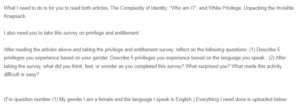Reflection – Privilege and Entitlement
Five Privileges I Experience Based on My Gender
According to McIntosh (1989), people can be taught not to recognize privilege even when they experience it. However, most people can recognize the privileges they experience by comparing their experiences with those of others. For example, my interaction with male colleagues and friends and my observation of how they are treated in the workplace have enabled me to recognize that I experience various privileges based on my gender. The privileges include flexible working hours, respect from people in authority, access to business funding, education sponsorships, and support from spouses.
Five Privileges I Experience Based on the Language I Speak.
Understanding and speaking English, the language spoken by most people worldwide, has enabled me to get various privileges. The main privileges include access to educational institutions, eligibility for leadership positions, access to many job opportunities, access to visa and passport to travel to different countries, and the opportunity to share my ideas in the community. Many learning institutions consider English part of the eligibility criteria because most courses are taught in English, thus creating an advantage for people who can speak English. English is also essential in communication for people in leadership positions. Traveling to different countries also requires understanding English because it is a universal language, hence its relevance in passport and visa applications. English is also the official language in many organizations, thus making it an important language to learn to access job opportunities.
Privilege and Entitlement Survey Reflection
According to Tatum (2016), a person’s identity is complex and influenced by family dynamics, individual characteristics, political and social contexts, and historical factors. As I was taking the survey, I thought about the history of my ethnic group and how historical factors have shaped how people from our ethnic group are treated in society. I felt that society assigns ethnic privileges based on the wrong assumptions developed from social issues in the history of ethnic groups. For example, I felt that societies give ethnic privileges based on the contributions that people from different ethnic groups have made based on the history of the ethnic group’s involvement in society. For instance, ethnic groups with a history of negative contributions to society, such as drug abuse and violence, are assigned less privilege than those with a history of positive contributions, such as the advancement of education and healthcare. What surprised me is that I have acknowledged how people from ethnic groups are treated, and I am okay with it even though it may negatively impact my life. I found the activity easy because I could relate to most of the questions in the survey.
References
McIntosh, P. (1989). White privilege: Unpacking the invisible knapsack. https://psychology.umbc.edu/files/2016/10/White-Privilege_McIntosh-1989.pdf
Tatum, B. (2016). The complexity of identity: “who am I?” https://diversity.arizona.edu/sites/default/files/2021-12/Tatum_2000_The%20Complexity%20of%20Identity.pdf
ORDER A PLAGIARISM-FREE PAPER HERE
We’ll write everything from scratch
Question

Reflection – Privilege and Entitlement
What I need to do is for you to read both articles, The Complexity of Identity: “Who am I?”. and White Privilege: Unpacking the Invisible Knapsack.
I also need you to take this survey on privilege and entitlement
After reading the articles above and taking the privilege and entitlement survey, reflect on the following questions: (1) Describe 5 privileges you experience based on your gender. Describe 5 privileges you experience based on the language you speak. (2) After taking the survey, what did you think, feel, or wonder as you completed this survey? What surprised you? What made this activity difficult or easy?
(For question number (1) My gender I am a female and the language I speak is English.) Everything I need done is uploaded below.

